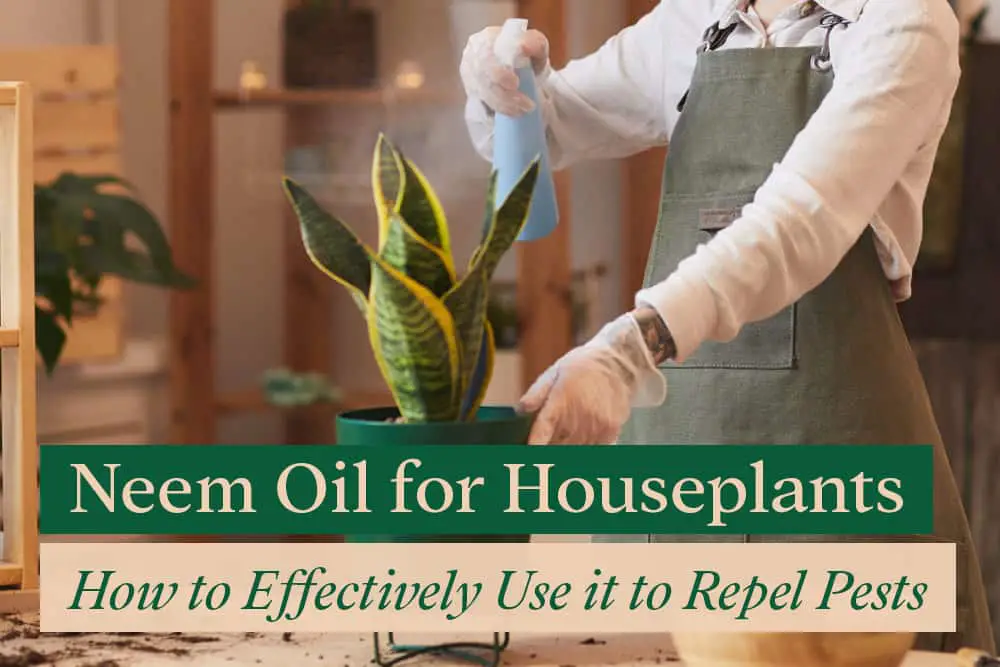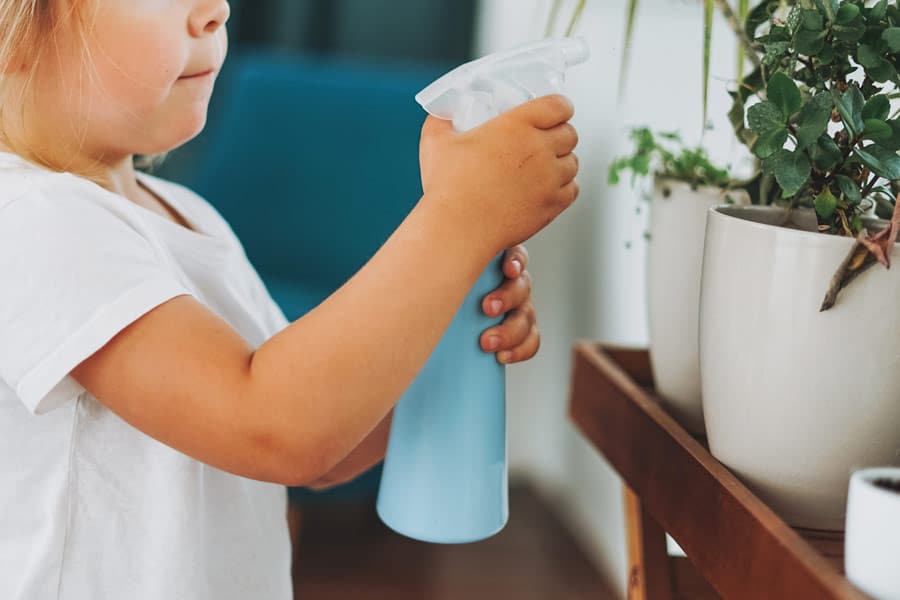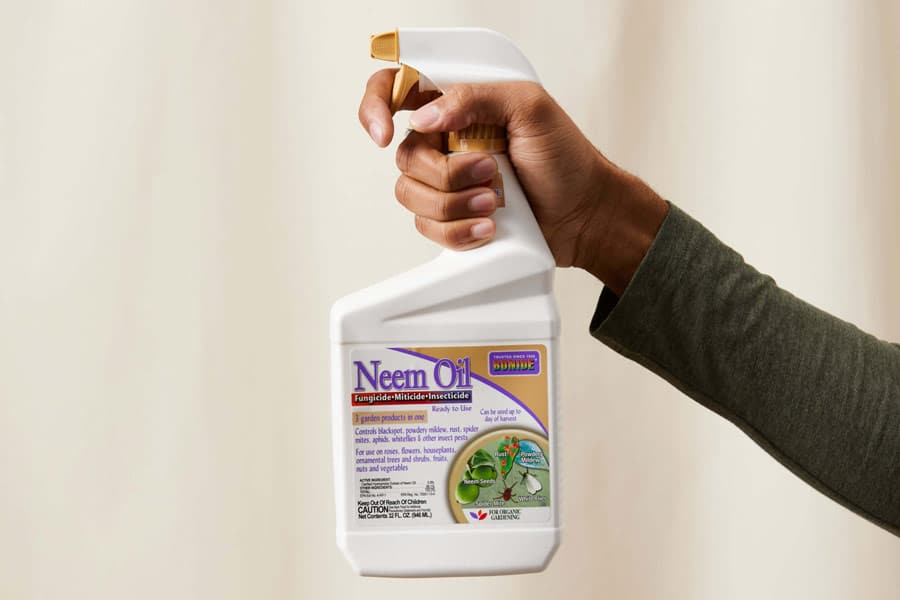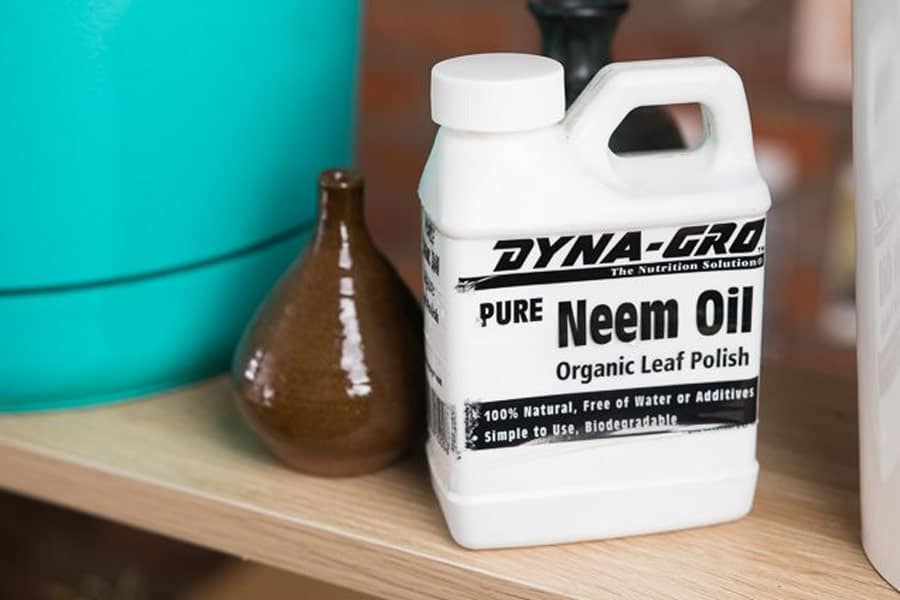
As one of the most popular oils for houseplants, Neem Oil is an all-natural herbaceous insecticide that keeps away bugs and pests, boosts plant health, and provides plants with a natural defense against disease.
Neem oil contains Azadirachtin, a natural compound that helps kill and repel pests. Apply the pesticide on the soil and underside of leaves at least twice a month for both long-term prevention and infestation treatment.
My experience with neem oil was great. I’ll share what steps to take if your plant needs neem oil and how to use it effectively.
Let’s begin!
What is Neem Oil
Neem oil is a naturally occurring oil that comes from the neem tree. Many people use it for a variety of purposes, such as toothpaste, soaps, and cosmetics ingredient. However, for centuries it has been also popularly used as a natural pesticide.
Why do I prefer Neem Oil better than Other Options?

My home is crowded with my twin boys and dogs. That is why I prefer using neem oil for houseplants. Neem oil has natural ingredients that are non-toxic to humans and animals.
In fact, insects need to ingest the neem oil for it to have an effect. Therefore, it will only affect pests that pose a genuine threat to your plant. Beneficial insects such as bees or other pollinators will not be affected by spraying neem oil.
Unfortunately, the Neem oil smell is one of the things that I don’t like about it. It smells like sulfur and garlic and it’s pretty strong, but luckily the scent doesn’t last long. If you are sensitive to smell, you might consider wearing a face mask.
How Does Neem Oil Effect Pests?
Neem oil does not kill pests on contact in the same way that many pesticides do. Instead, it contains Azadirachtin which interferes with insect hormone systems in a way that prevents the pests from feeding, growing, and reproducing.
It works best against small soft-bodied pests like mealybugs, aphids, spider mites, thrips, and whiteflies. On the other hand, Neem oil is non-toxic to beneficial insects like ladybugs and bees.
Additionally, Neem oil has anti-fungal properties which help control powdery mildew, black spots, and root rot fungus, which are common houseplant diseases.
Do All Plants Like Neem Oil?
Neem oil is safe to use on most indoor plants. However, you should test to make sure it will not harm your plant before using it.
To test it, apply a very small amount of the neem oil mixture to a small area on the plant, just under its leaves. Watch for at least 24 hours (the longer the better) for any signs of harm, like yellowing, drooping, or leaf loss. If there is no sign of harm, it is safe to spray the whole plant.
Also, double check the label of your Neem oil product as different brands have different concentration levels. This means, while one concentration might not hurt anything, others may burn leaves and kill beneficials.
Choosing the Right Neem Oil for Your Plant
When you are buying neem oil for houseplants in the market, you have two options. You can either buy the ready-to-use sprays or concentrates.
Ready-to-use sprays

The main advantage of buying ready-to-use sprays is they are ready to be used immediately, saving you a step. They are also easier to use as the spray comes in a bottle and you just need to shake it and apply it to plants.
Also, these products are usually less expensive than buying a concentrate.
But, my main concern with ready-to-use sprays is that there’s no way of knowing in detail what kind of inert ingredients are present. Inert ingredients are classified as confidential by law in most countries. This means the manufacturer can keep this information hidden from the public.
Pure Neem Oil Concentrate

The main advantage of buying pure neem oil concentrate is that you are actually making the pesticide from scratch. In this way, you know what exact ingredients are used in it.
But, I need to warn you that pure neem oil concentrate can be very strong if not used correctly. It is important to dilute the concentrate first before applying it to your plants or you will risk burning your plants. More on that later.
Also, if you are buying concentrate, choose the cold-pressed product. Plenty of nutrients are lost during the hot pressing process. But in cold pressing, all of the nutrients are preserved.
How to Apply Neem Oil on Plants
As I mentioned earlier, pure neem oil concentrate is more powerful than ready-to-use sprays. So you should dilute it before applying it to your plants.
Simply mix 1 teaspoon (5 ml) of emulsified neem oil, 1/2 teaspoon (2.5 ml) of mild liquid soap, with 1 quart (1 L) of warm water. Spray the mixture on both sides of plants’ foliage, stems, and soil. Let the plants dry in the shade for about 2-3 days before putting them back in the sun.
Remember to fully emulsify the neem oil before adding it to the water. Otherwise, you may end up with some undiluted neem that can cause sunburn damage to the leaves.
Don’t forget to shake the neem oil before using it again. Neem oil will try to re-separate from the water with time.
Apply directly to the soil
Applying neem oil directly to the soil will protect your plants’ root from pests, such as fungus gnats. It will hinder their ability to feed and reproduce, which will eventually kill them.
Spray on the leaves
Based on my experiences, I tend to find pests, insects, and their eggs on the underside of leaves. For this reason, I scheduled spraying the leaves (both sides) every two weeks.
Shine the leaves
After each spraying, I like to wipe the leaves with clean clothes. I removed the excess residue from the leaves using this method. And it gives the leaves a glossy look!
When is the best time to apply Neem Oil?
You can apply neem oil at any time of the year, and during any season as long as there are no major changes in temperature.
Consider using neem oil in the evening or early morning to ensure it does not drive away beneficial insects from pollinating. Also, you need to avoid extreme high temperature as it leaves the foliage more prone to sunburn.
How often Should you apply it?
You should schedule your neem oil sprayings at least every 14 days as a preventive measure so you can control the pests and prevent them from spreading.
However, during pest infestation, you can spray it more frequently. You will also need to use insecticidal soap before applying neem oil.
Neem oil has a long shelf life as it does not go bad quickly. The shelf life of neem oil can extend up to 2 years if stored properly in a room temperature place and away from direct sunlight.
Where to Buy Neem Oil
Depending on where you live, neem oil might be harder to find and more expensive than you think.
In the US, you can find them readily available in any big-box store, local plant nursery, or even online. This is the Neem Oil concentrate that I bought for my plants.
Unfortunately, if you are living in Canada or the UK, you might have a hard time finding neem oil due to cultural and legal restrictions. As a result, they are harder to find and more expensive.
However, there are other options that can be used as a substitute for neem oil, such as Rosemary oil or organic Olive oil.
Related Questions:
Is Neem Oil poisonous?
I would recommend avoiding ingesting high concentrations of undiluted neem oil. It can be toxic and also cause seizures in infants and young children.
When diluted with water and applied correctly, neem oil is safe to use around humans, birds, pets, mammals, and most wildlife. However, neem concentrates can be slightly toxic to fish and amphibians, so avoid using this oil on plants that are commonly found in ponds and aquariums.
Thank you for reading, you might be interested to read my other articles:
